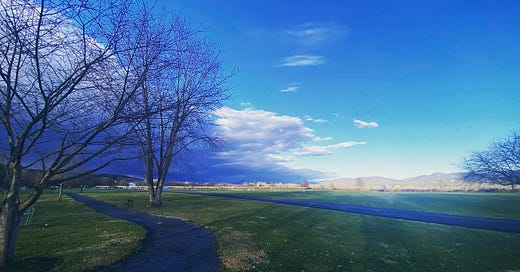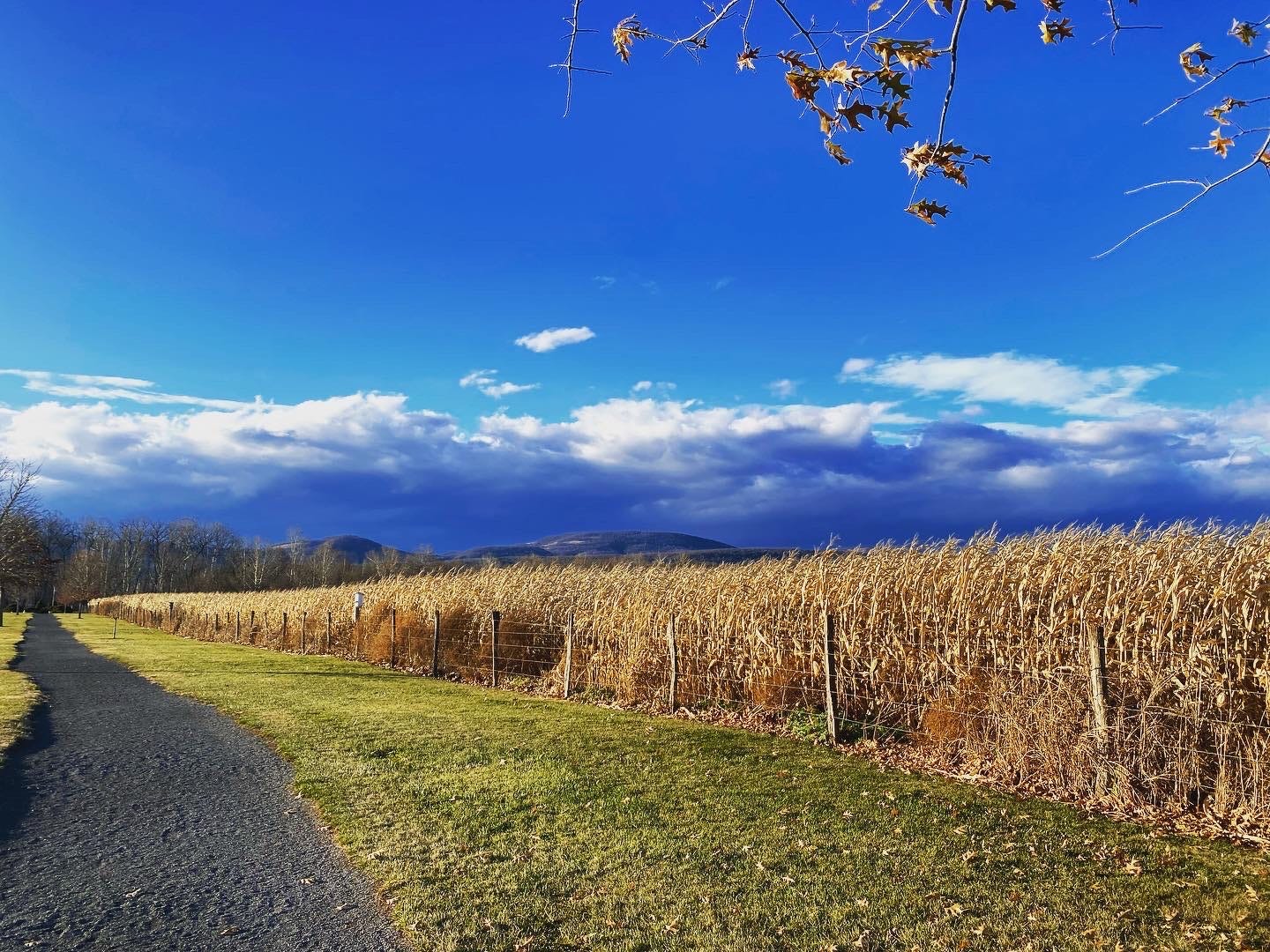We live on a very rocky mountainside, so we frequently walk our dogs at the park in town. It’s a 20-mile round trip affair that affords us a couple miles of level track circling around soccer fields, pavilions and a playground. Crops that alternate between corn and soybean each year and a fence with bluebird houses surrounds the park on two sides, and shallow, silvery branch of the Potomac on the other. Further out, rolling mountains on all sides create a pretty idyllic location and one we’re glad we found just prior to March 2020 when the world shut down and we found ourselves huddled in the middle of the woods barely knowing a soul. The park became the only outing we could do for many, many months.
Early on it seemed no one else used the park except for several guys from El Salvador or Honduras, possibly some from Ethiopia or Myanmar, playing soccer, and their families who came to cheer them on. While West Virginia is not known for being diverse, our town is one of the exceptions because of its huge employment draw for migrants and refugees. The town isn’t that big, only about 3000 people, but the school has the most diverse population in the state. As of 2019, 18 languages were spoken in the district. It was an exception that broke my brain in a really great way. My small NJ hometown is less diverse. My high school in rural PA even less than that. The cost, however, is an ugly chicken processing plant someone with really bad vision for planning approved to be plunked right in the center of an otherwise potentially quaint colonial town. While the plant provides an easy way to obtain jobs for many of the people moving here who have to figure out how to make a new home in a new country with very little help, the town has the constant stink of death to it that only one who is profiting from is likely to tolerate.
Sometimes the park also takes on that odor, but we stroll happily regardless and try to breathe from our mouths. But then we started to notice the drug deals—between white people, I might point out. The park has three little lots for cars. Two by the playground, and one in the back for the boat launch. We began to see a pattern: A vehicle is parked in the back lot, person inside. A car pulls in from the road, drives all the way to the backlot, circles and leaves, or circles and parks. Sometimes the second vehicle does this several times. We weren’t sure how much more obvious they could get. Until they got more obvious. Quickly it became clear that when not circling the lot, the second vehicle would park a few spots over from the first. The driver would get out, throw something away in the trash can between them, and then return to his car and wait. The first time we witnessed this, we thought, “That’s your plan?” They can’t be that stupid. But then again, I’m the one walking around with a bag of dog shit in my hand.
Now most times we are there, we see this routine. Always the same trash can. Two people from two cars just happen to have to throw something away. I can’t tell you how tempting it is to go up to them and call them out but in a state that allows anyone eighteen and up to carry a gun I won’t be doing that any time soon. But why put on such a production? Why not just hand it over through a window? I think we’ve seen a cop in that park maybe twice in the three-plus years we’ve been walking there. Clearly they don’t care. I want to lean in on their windows and say “you’re fine, honey” but I’m also thinking what a sad existence. I know enough from the news, and even more heartbreakingly from my students, how badly the opioid epidemic has a hold on this area, but when you can witness it on a daily basis you really can’t ignore it. And I guess for levity you make fun of it.
Now that the pandemic has released its hold on us a bit, the park is quite a bit livelier. Quinceaneras and church services were held in the pavilions all summer, kids’ soccer and little league practices resumed, many families went swimming, tubing, and kayaking, and we’ve even seen a couple pandemic puppies grow up. Through it all the drug deals never cease. I know that issues like these are everywhere, but there’s something about living in such a naturally beautiful area that makes you think nothing bad should happen here. I mean, everyone here puts their grocery carts away, for god’s sake. They’ll talk to anyone in the check-out line because nine times out of ten it’s a neighbor. They wave to you as you drive down the road whether they know you or not. They let you know you’ve dropped your cash and help you fix your brakes in a pinch.
People here are nice. Sometimes they move too slow for this Northeasterner, and sometimes I run in to an exception to the nice part, but from the outside it doesn’t seem like the place you’d witness drug deals on the daily at a park for young families, dog-walkers and Baptists who like to have outside church. It makes me wonder if I was less observant in New Jersey, or if there was just more going on around me so I missed the darker corners. There’s an obvious socio-economic aspect in play and as I was just lamenting to a friend about how the lack of money is the greatest stressor, that doesn’t elude me. But lack of money has also been my greatest motivator. It got me back to school, it got me published, it’s gotten me countless jobs and now has me pressing even further into uncomfortable, but hopefully good territory. I’m able to look at my situation as temporary because I know I have options. I know I can get a job, and more jobs. Here, it seems, because there are so few options of upward mobility, it simply turns self-destructive for so many. What will become of the migrant and refugee families, I wonder. Will this be a stepping stone for them and their children, or will they succumb to the back parking lot?
We’re not going to be living here for much longer. It was a pit-stop in the ever-changing journey Joe and I have been on for eight years. A pit-stop that came at just the right time, giving us a sanctuary after trauma, space to grow gardens and blaze trails when the world shut down, revitalized our love for the natural world at our feet and the magnificent stars above our heads that we got to see clearly for the first time in years. We’re not sure where we are going next; more on that in 2023; but I’m glad for the time we had here. And whether we stay in West Virginia or not, I’m so thankful for having my brain broken in several ways just by living in a new, unfamiliar place. The best learning experience is when your own perspective is proved wrong and you embrace the new truth. I wish that for every young person here especially, that they are able to see outside the limits of their small town, outside the dark parking lots and stinky processing plants, and the gorgeous mountains and rolling green farms that seem to lure people into a trance. That like their neighbors from all over the world they have the courage to go somewhere new. Even if it’s just a pit-stop.






you brought up a long-forgotten time i lived near the town of emeryville, ca where there was a large, windowless concrete block that spewed that stench of death you mentioned, only worse: it was an animal rendering plant. i didn’t live there long but it’s a smell i will never forget.
flash forward ten years, i’m living in oakland now, but the town of emeryville has decided to upscale. level out whole blocks of abandoned businesses (thank you reagan voodoo economics) and bring in developers. a mall came, and an ikea, and in that spot where the horrible smell came from...
pixar.
and emeryville boomed. property values went up and developers built new homes. it’s sometimes strange to think of places never changing, or not changing for the good, and then something happens and it’s like a dam burst of change.
you’ll move on and who knows how much change you’ll leave in your wake. best of luck with the next phase of your adventures!